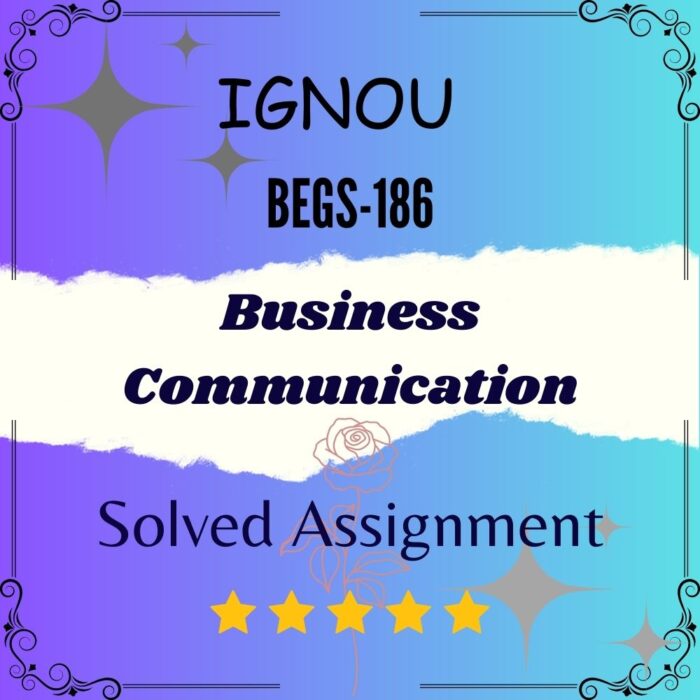BEGS 186 Solved Assignment – Business Communication
Business communication is one of the most important aspects of any business organization, which involves conveying messages to various stakeholders to achieve organizational objectives. Effective communication plays a significant role in enhancing business operations and building strong relationships with customers, suppliers, and employees. Therefore, it is essential for business professionals to possess excellent communication skills to convey their ideas, thoughts, and messages effectively.
This article will focus on BEGS 186, a solved assignment on Business Communication, which covers various topics related to communication skills, communication barriers, and effective communication strategies.
Section 1: Understanding Communication and its Barriers The first section of the BEGS 186 assignment focuses on the definition of communication and its types. Communication refers to the exchange of information, ideas, and thoughts between two or more people. It can be classified into verbal and non-verbal communication. Verbal communication includes speaking, listening, and writing, while non-verbal communication includes body language, facial expressions, and gestures.
The second part of the assignment covers communication barriers. Communication barriers are obstacles that hinder the effective exchange of information between the sender and receiver. There are various communication barriers, such as cultural differences, language barriers, physical barriers, and emotional barriers. To overcome these barriers, one must be aware of the communication barriers and take measures to eliminate them.
Section 2: Communication Skills The second section of the BEGS 186 assignment focuses on communication skills. Communication skills are the ability to express oneself effectively and efficiently. These skills include speaking, listening, writing, and non-verbal communication. Effective communication skills are essential for business professionals to convey their ideas, thoughts, and messages clearly and concisely.
The first part of the section covers the importance of speaking skills. Speaking skills refer to the ability to express oneself clearly and effectively. These skills are essential for business professionals to convey their ideas and messages in a clear and concise manner. The assignment covers various techniques for improving speaking skills, such as using appropriate language, maintaining eye contact, and using proper tone and pitch.
The second part of the section covers listening skills. Listening skills refer to the ability to understand and interpret messages conveyed by others. Effective listening skills are essential for business professionals to understand their clients’ needs, employees’ concerns, and suppliers’ expectations. The assignment covers various techniques for improving listening skills, such as active listening, paraphrasing, and reflecting.
The third part of the section covers writing skills. Writing skills refer to the ability to convey ideas and messages in a clear and concise manner through written communication. Effective writing skills are essential for business professionals to create professional documents, such as business proposals, reports, and emails. The assignment covers various techniques for improving writing skills, such as using clear and concise language, using proper grammar and punctuation, and using an appropriate tone.
The fourth part of the section covers non-verbal communication. Non-verbal communication refers to the use of body language, facial expressions, and gestures to convey messages. Effective non-verbal communication is essential for business professionals to convey their confidence, credibility, and authority. The assignment covers various techniques for improving non-verbal communication, such as maintaining eye contact, using appropriate gestures, and using appropriate body language.
Section 3: Effective Communication Strategies The third section of the BEGS 186 assignment focuses on effective communication strategies. Effective communication strategies are essential for business professionals to convey their messages and achieve organizational objectives.
The first part of the section covers the importance of clear communication. Clear communication refers to conveying messages in a concise and easily understandable manner. Effective clear communication is essential for business professionals to convey their ideas and messages to stakeholders in a way that is easy to understand.
The second part of the section covers the importance of active listening. Active listening refers to paying attention to the speaker, interpreting their messages, and responding appropriately







Reviews
There are no reviews yet.